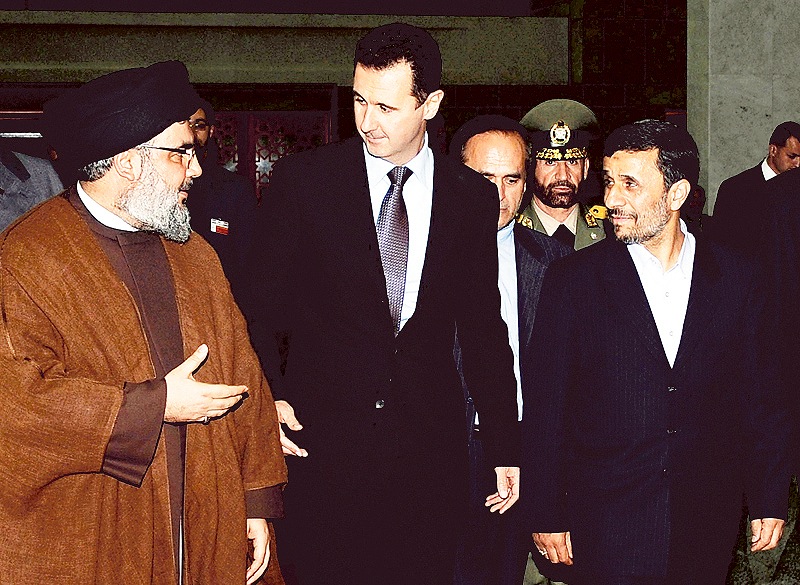The situation in Syria is deeply tragic. Tens of thousands of people are dying, and many more driven from their homes, as a brutal dictator is strengthened in his ability to stay in power against a legitimate internal rebellion. The fact that this aid comes from the Lebanon-based Shiite Hezbollah brings the region closer to a major intra-Islamic civil war, with Shiite-majority Iraq and wholly Shiite Iran pitted against the Sunni majority in Syria, the Sunni populations in Iraq and Lebanon, and the Sunni regimes in Saudi Arabia and the Gulf States.
The reaction of some American leaders is that it is the responsibility — if not the duty — of the United States to fix it. This is understandable, but wrong. This is not a tragedy that America created; it is not a crisis which threatens our national security, or our economic interests; it is not a situation in which there is an obvious way to ensure the vindication of our values; and most importantly, there is nothing we can do to fix it.
I know that advocates of America’s taking ownership of this terrible problem disagree with me, but I have not heard or read from any of them a coherent explanation of what it is they believe America can do to make it better.
None of those criticizing President Obama for the reluctance he has shown to make this one more American military engagement in the Arab world thinks supplying arms to the anti-Assad forces will be enough. And even if sending anti-tank and anti-aircraft weapons to them is called for, let other nations do it. American involvement will just give Assad and his anti-American Shiite allies the opportunity to gain more popular support by pointing to a U.S. role. If England, France or Saudi Arabia think these weapons should be supplied, they should do the supplying.
It is time to reject the view that none of our allies can take action on their own, and that the military economic and political burden must always be borne heavily, if not exclusively, by the United States.
President Obama’s thoughtful explanation of the reasons not to enmesh ourselves here is not only a far more mature analysis than President Clinton’s taunt that he risks “looking like a wuss.” It is the beginning of his welcome, implicit repudiation of a phrase he has previously used, and which imposes on us burdens beyond either our responsibility or our capacity: that “America is the indispensable nation.”
That notion — that it is our mission to police the world — has strained us economically beyond our capacity, and imputes to us an omnipotence that we do not possess.
In fact, of course, the demand that we solve this crisis goes beyond supplying sophisticated arms to the rebels, even if we could be reasonably assured that they would go to forces we could trust to use them responsibly, and in support of values we share.
Sens. John McCain, Lindsey Graham and others want direct American military intervention, and implicit in this is the assumption of a leading American role in assuring a coherent replacement in Syria after Assad’s fall.
Inconsistently, those urging the use of American air power — as a first step — are also deficit hawks. Reducing our debt, with no new taxes, is hardly advanced by another military intervention, with open-ended costs.
Not only is post-invasion Iraq a country increasingly violent, the Shiite regime we installed there is now a major source of support for Assad. Without Iraqi Prime Minister Nouri al-Maliki’s permission, Iranian planes carrying weapons to Assad could not fly through Iraqi air space.
On another front, the national trauma of the murder of our diplomats in Benghazi is the result of our taking responsibility to a large degree for bringing order to a chaotic, violent Libya.
We do have security interests in protecting Saudi Arabia and the Gulf States from Shiite radicalism, although our pursuit of these repressive regimes obviously refutes any argument that we must overthrow Assad because we are inviolably committed to the defense of human rights. But increasing the anti-Americanism that a third military intervention in an Arab country would bring does not help.
Finally, there is no reason to believe that a post-Assad Syria, with strong pro-al-Qaida elements, would make Israel any safer. This is not a reason to oppose the anti-Assad forces, but neither is support for Israel a reason to arm them.
(And harsh critics of Israel’s approach to peace should not ignore this latest example of Hezbollah’s destructive violent role.)
I very deeply regret the great loss of life in Syria, and I would be very happy to see Assad deposed. But I do not believe that removing Assad and guaranteeing a peaceful, functioning post-Assad Syria are results that are our responsibility to achieve.
And I am certain that as much as we desire those results, achieving them is neither within our capacity nor necessary to our security.
Barney Frank is a retired congressman and author of landmark legislation. He divides his time between Maine and Massachusetts.
Send questions/comments to the editors.



Success. Please wait for the page to reload. If the page does not reload within 5 seconds, please refresh the page.
Enter your email and password to access comments.
Hi, to comment on stories you must . This profile is in addition to your subscription and website login.
Already have a commenting profile? .
Invalid username/password.
Please check your email to confirm and complete your registration.
Only subscribers are eligible to post comments. Please subscribe or login first for digital access. Here’s why.
Use the form below to reset your password. When you've submitted your account email, we will send an email with a reset code.